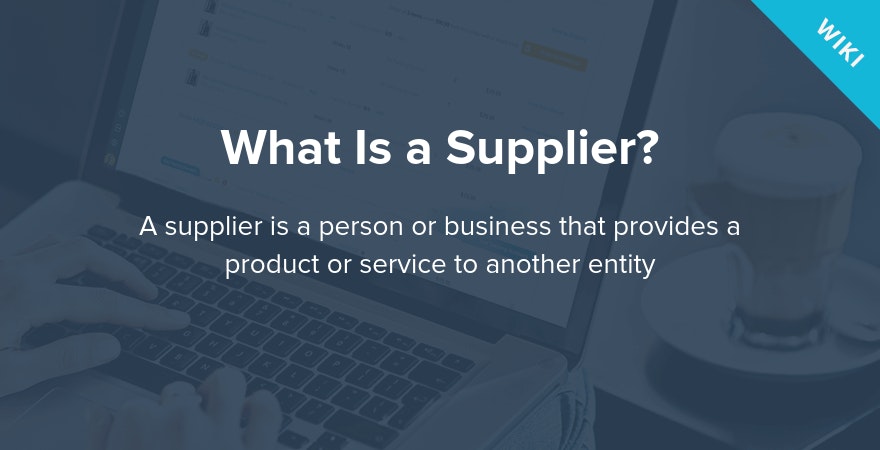
Supplier



What is a supplier?
A supplier is a person or business that provides a product or service to another entity. Acting as intermediaries, suppliers bridge the gap between manufacturers and retailers by offering the raw materials, products, or services that businesses require for their operations.
The relationship between a business and its suppliers is symbiotic. Businesses rely on suppliers for the necessary inputs for their products or services, and suppliers depend on businesses to purchase their offerings. This interdependence forms the basis of the supplier-customer relationship in the business world.
→ Click Here to Launch Your Online Business with Shopify
Types of suppliers
Suppliers come in various forms, each serving a unique role within the supply chain. Here are some common types of suppliers:
- Manufacturers: These are the entities that produce goods from raw materials. They are often the first link in the supply chain, supplying products to wholesalers or retailers.
- Wholesalers: Wholesalers buy goods in large quantities from manufacturers and then resell them in smaller batches to retailers. Selling wholesale is crucial in the supply chain as it facilitates the distribution of goods from manufacturers to various retailers.
- Distributors: Distributors, like wholesalers, buy products from manufacturers. However, they often offer additional services such as marketing and after-sales support. They play a significant role in reaching out to the market and promoting the products.
- Independent craftspeople: These are individuals who produce and supply their own goods. They might sell directly to consumers, to retailers, or through a distributor.
- Importers and exporters: These suppliers operate on an international scale, importing goods from manufacturers in one country and exporting them to retailers in another. They play a critical role in global trade and the international supply chain.
Understanding the different types of suppliers helps businesses choose the right ones based on their specific needs and operational requirements.
Importance of suppliers to the product life cycle
Suppliers play a vital role at every stage of product development, from conception to distribution. Their influence extends beyond the provision of raw materials or services and impacts the quality, cost, and delivery of the final product.
Here's a look at how suppliers contribute at each stage:
- Sourcing raw materials: Suppliers provide the essential raw materials needed to create a product. The quality and cost of these materials can significantly influence the final product's quality, cost, and profitability.
- Ensuring quality control: Suppliers are often responsible for the initial stages of quality control. They ensure that the materials or components provided meet the required standards and specifications.
- Facilitating production process: By delivering materials or components on time, suppliers enable smooth production processes. Delays in supply can lead to production hold-ups, affecting the product's time to market.
- Assisting in distribution logistics: Some suppliers, particularly distributors, play a role in getting the product to the market. They help in transporting the goods from the production site to various retail outlets.
Through their significant contribution to the product lifecycle, suppliers have a direct impact on a product's success in the market. Therefore, maintaining a good relationship with suppliers is crucial for any business.
What is supplier relationship management?
Supplier relationship management (SRM) is a systematic approach for developing and managing partnerships with suppliers to achieve a competitive advantage. It involves creating closer, more collaborative relationships with key suppliers in order to uncover and realize new value and reduce risk.
SRM is crucial in business as it helps in managing supplier interactions effectively, ensuring a steady supply of goods or services, and fostering strong, mutually beneficial relationships. It is a key component of supply chain management and a determinant of its success.
Benefits of SRM
- Cost savings: Effective SRM can lead to significant cost reductions through improved process efficiency and reduced waste.
- Improved quality: By fostering closer relationships with suppliers, businesses can work collaboratively to improve product quality.
- Better supplier performance: SRM allows businesses to monitor supplier performance, identify issues early, and work together to implement improvements.
- Risk mitigation: Through SRM, businesses can identify potential supply chain risks and work with suppliers to develop mitigation strategies.
Best practices for SRM
Implementing SRM effectively requires a strategic approach that focuses on building and nurturing relationships with suppliers. Here are some best practices that can guide businesses in their SRM efforts:
- Regular communication: Maintain open lines of communication with suppliers to address issues promptly and foster mutual understanding.
- Performance evaluation: Regularly assess supplier performance against agreed-upon metrics to ensure they meet expectations.
- Long-term relationship building: Focus on building long-term relationships with suppliers, rather than short-term, transactional interactions.
- Collaboration: Work collaboratively with suppliers to identify and implement improvements, rather than imposing demands.
Through effective SRM, businesses can optimize their supply chain, improve product quality, and achieve better business outcomes.
Supplier vs. Distributor: What’s the difference?
While the terms "supplier" and "distributor" are often used interchangeably in the business world, they represent different stages in the supply chain and perform distinct roles.
A supplier is a person or business that provides a product or service to another entity, often a distributor. Suppliers can be manufacturers who provide raw materials or finished goods, or they can be businesses that supply services. They are typically responsible for ensuring the quality of the products and delivering them to the next link in the supply chain.
On the other hand, a distributor is an entity that buys products from suppliers and sells them to the retailer or the end customer. Distributors often provide added services such as product promotion, market research, and after-sales services. They play a crucial role in getting the product from the supplier to the market.
While both suppliers and distributors play critical roles in the supply chain, the focus of suppliers is more on the production and provision of goods or services, whereas distributors are concerned with getting these goods or services to the market.